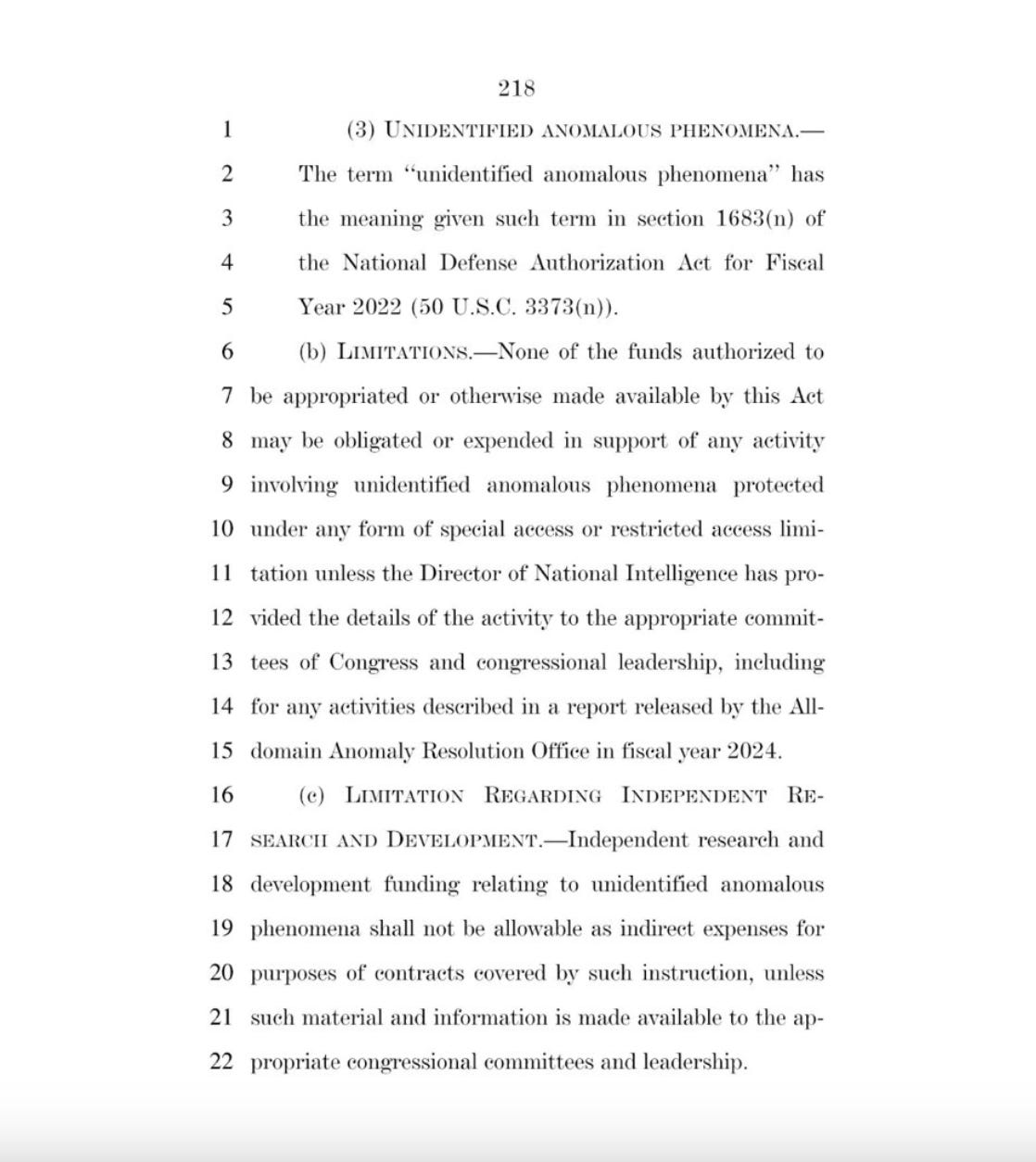“The American public has a right to learn about technologies of unknown origins, non-human intelligence, and unexplainable phenomena.”
- SENATE MAJORITY LEADER CHUCK SCHUMER
Imagine the most powerful lawmakers in the country pushing for the disclosure of potential alien technology. Sound far-fetched? Welcome to 2024, where UFOs have moved from conspiracy theory to the halls of Congress.
Why would seasoned politicians risk their reputations on such a controversial topic? The answer may be more shocking than you think. Recent legislation suggests some in government believe we're sitting on radical discoveries, and they're fighting to bring them to light.
From alleged recovered "non-human" technology to unexplained encounters in our skies, the push for transparency is gaining momentum. But powerful forces are pushing back. The battle over UAP disclosure is heating up, and the implications could redefine our understanding of reality itself.
Two groundbreaking pieces of legislation - the UAP Disclosure Act (UAPDA) and the Safe Airspace for Americans Act (SAAA) - stand at the forefront of a political battle. Despite bipartisan support and high-profile backers, these bills face significant hurdles.
In this week's article, we'll discuss these pieces of legislation, examining their current status, the resistance they face, and remaining hopes for their passage.
UAP Disclosure Act
In July 2023, the political landscape surrounding UAP disclosure shifted dramatically. Senate Majority Leader Chuck Schumer, along with a bipartisan group of senators, introduced the UAPDA- a sweeping 64-page bill that promised to change the game in regards to government transparency on the UFO phenomenon. This wasn't just a fringe proposal trying to score political points; it was a highly detailed piece of legislation that indicated the existence of classified government programs studying UAP.
Key Provisions
The bill's key provisions were ambitious:
Creation of a UAP Records Collection. The National Archives would be required to establish and maintain a collection of all government records related to UAP.
Establishment of an Independent Review Board. A UAP Records Review Board would be created to oversee the review and release of UAP-related records.
Eminent domain over "non-human" technology. The government would be mandated to exercise eminent domain over any recovered technology or information of potentially non-human origin.
Time-limited classification. A 25-year maximum classification period would be imposed on UAP records, after which they must be declassified unless explicitly exempted.
Perhaps most importantly, the act carried a "presumption of immediate disclosure" for UAP records - a clear departure from decades of government secrecy.
However, the path from introduction to enactment has proved difficult. As the bill moved through the House of Representatives, it faced significant resistance, particularly from Congressman Mike Turner who stated he though the Senate sent forward a “…poorly drafted piece of legislation”. National security concerns were cited as the primary reason for opposition, with critics in the House arguing that full transparency could compromise sensitive intelligence operations and defense capabilities.
The result? A significantly watered-down version of the Act was ultimately incorporated into the 2024 National Defense Authorization Act (NDAA), signed into law by President Biden on December 22, 2023.
While this version still mandates the creation of a UAP Records Collection, it grants agencies broad discretion to withhold information deemed sensitive to national security. More importantly, the independent review board and eminent domain provisions were stripped from the final legislation.
For many, the removal of these key transparency provisions means the legislation will not have the teeth to meet its intent.
Hold on folks…
But the story doesn't end there. As of the time of this writing, efforts to revive the original spirit of the UAPDA continue. Senator Schumer and his allies are pushing for a V2 of the legislation to reinstate some of the stripped provisions. They argue (correctly, in my opinion) that the watered-down version fails to deliver the transparency promised and needed by the American public.
To further bolster Senator Schumer’s push, Congressman Garcia introduced legislation in May 2024 in the House to re-establish the missing provisions back into the 2025 NDAA. However, this attempt was blocked for consideration by the rules committee.
At the time of this writing, the UAPDA V2 has not been included in the initial version of the language for the 2025 NDAA. Supporters of the legislation now must pin their hopes on a floor vote to include the act, but this path remains uncertain.
Safe Airspace for Americans Act
While the UAPDA aims for broad government transparency, another piece of legislation takes a more targeted approach. The SAAA, introduced by U.S. Representatives Robert Garcia (D-CA) and Glenn Grothman (R-WI) on January 11, 2024, focuses on a singular aspect of the UAP phenomenon: its impact on aviation safety.
This bipartisan bill emerged in the wake of testimony, including my own and that of former Naval Aviator Commander David Fravor (Ret.), before Congress in July 2023. Our accounts of encountering UAP while on duty highlighted a pressing need: a safe, structured way for pilots to report these incidents without fear of ridicule or professional repercussions. If you’d like to learn more about why pilots aren’t reporting UAP, check out my article on the topic.
Key Provisions
The key provisions of the Safe Airspace for Americans Act include:
Establishing a dedicated UAP reporting mechanism. The Federal Aviation Administration (FAA) would be required to either modify existing systems or create new ones specifically for UAP reports.
Legal protections for reporters. Pilots and other aviation professionals would be shielded from medical disqualification or employer retaliation for submitting UAP reports.
Data compilation and analysis. The FAA would be tasked with collecting and forwarding UAP report data to relevant agencies to assess potential threats to national airspace.
Destigmatization efforts. The Act mandates the FAA to develop and implement a strategy to reduce the stigma associated with UAP reporting among pilots.
Vetting the Legislation
Before its introduction, I took the initiative to vet the SAAA's key provisions across my network. This process involved extensive consultations with hundreds of aviators, pilot unions, and safety experts. The response was overwhelmingly positive, with pilots particularly excited about the Act's potential to address long-standing issues surrounding UAP reporting.
The bill has since gained endorsements from respected organizations such as Americans for Safe Aerospace (ASA) and the American Institute of Aeronautics & Astronautics (AIAA). This work has bolstered the SAAA's credibility, positioning it as a pragmatic, bipartisan step towards enhancing aviation safety and our understanding of UAP.
However…
Despite its strong support and seemingly uncontroversial nature, the SAAA has faced unexpected hurdles in its journey to becoming law. Its first setback came when it failed to be included in the 2024 FAA reauthorization bill, despite last-minute efforts.
A subsequent attempt to introduce it as an amendment to the 2025 National Defense Authorization Act (NDAA) also met with rejection. The House Rules Committee, led by Rep. Tom Cole (R-OK), cited procedural reasons, stating that only amendments from the House Armed Services Committee (HASC) would be considered for the NDAA.
This rejection highlights a key challenge in passing UAP-related legislation: finding the right legislative vehicle. While the SAAA's focus on aviation safety might seem to make it a natural fit for FAA-related bills, its connection to the broader UAP phenomenon complicates matters.
Adding to these difficulties is the current polarization in DC. As we move deeper into a outright hostile election year, it becomes harder to imagine a bipartisan effort for… anything.
Despite these setbacks, I, and other supporters of the SAAA, remain committed to its passage. Representatives Garcia and Grothman are exploring alternative routes to bring the bill to a vote, including the possibility of introducing it as a standalone bill.
Pushing Forward
These setbacks, while frustrating, are not unique to UAP legislation. In fact, the progress made so far has been remarkably swift for a topic once considered so fringe. Often, major legislative changes can take years to materialize.
For those advocating comprehensive reform on the government's handling of UAP, sustained effort is crucial. Opposition will inevitably try to slow the process and diminish public interest. Your continued engagement can counteract this.
To support these bills:
Contact your representatives. UAPCaucus.com provides an easy-to-use guide and contact list.
For the UAP Disclosure Act's inclusion in the 2025 NDAA, consider signing the petition created by Lue Elizondo's UAP Disclosure Fund.
Regardless of your beliefs about UAP's nature, these bills promote transparency and safety - principles that benefit everyone. The sheer volume of credible reports and high-level interest suggests there's substance here worth investigating. Supporting these bills will help bring us closer to understanding what's truly happening in our skies.
Note from Ryan: Prior to publishing this article, UAP language was inserted and passed in the 2025 Intelligence Authorization Act (IAA). This is the first time that UAP language was included in the IAA. Specifically, the language states:
No committee-approved funds may “support of any activity involving [UAPs] protected under any form of special access…unless the Director of National Intelligence” notifies Congressional leaders first.
This is an intriguing development, as it opens up a new legislative avenue for UAP-related provisions. It will be interesting to see if the IAA continues to be used to enact UAP legislation in the future. Subscribe below to receive future updates on these developments.







Thanks very much Ryan ~ I appreciate your well written, informative analysis. The momentum is building toward greater transparency, and that is exciting. It’s about time!
I DO NOT BELIEVE YOU ARE CURIOUS ENOUGH TO OWN THE WORLD SIR. WHY? YOU ARE AFRAID TO KNOW. YOU CAN'T HANDLE THE TRUTH.! WOULD IT MAKE ANY DIFFERENCE IF YOU HAD YOUR OWN PERSONAL ENCOUNTER WITH A FLYING SHAPESHIFTER? I BET IT WOULD, WOULNT IT? OK. GROW SOME BALLS AND MEET ME , I WILL TAKE YOU TO THE PORTAL ON MY PRIVATE PTOPPERTY ON UNDERWOOD MOUNTAIN. THEN YOU CAN SEE THEM FOR YOURSELF. ITS RIGHT DOWN THE ROAD FROM MCMINVILLE, OREGON. ANY TIME NOW!!!